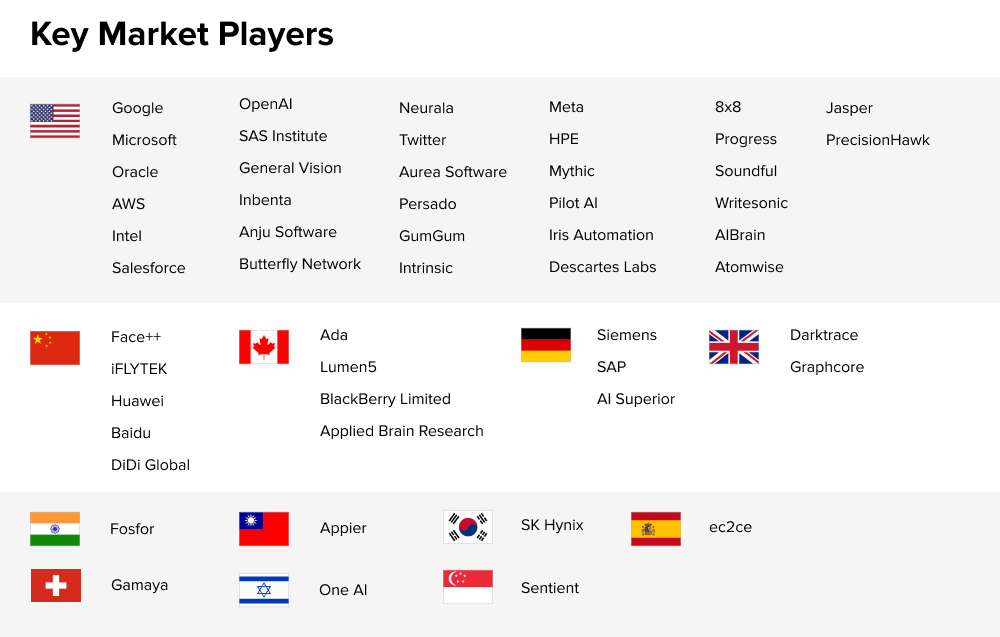The Artificial Intelligence (AI) market is rapidly evolving, transforming industries and revolutionizing the way we live and work. AI-driven solutions are becoming increasingly prevalent, from virtual assistants and autonomous vehicles to predictive analytics in healthcare. However, while the potential of AI is limitless, several challenges are impeding its growth, with data availability and quality standing out as a significant restraint. In this article, we’ll delve into the various business models within the AI market and explore the crucial role of data in overcoming these restraints.
Business Models in the AI Market
The AI market encompasses a variety of business models, each with its unique focus and value proposition:
- AI SaaS Product Vendor: These companies develop and maintain AI applications and services tailored to specific use cases or industries. They provide scalable, accessible platforms that allow customers to harness AI capabilities without needing extensive technical expertise.
- AI Platform Vendor: AI platform vendors offer a suite of tools, frameworks, and services that support the entire AI development lifecycle. Their aim is to empower developers and organizations to leverage the platform’s capabilities for building and deploying AI models at scale.
- AI Licensing and Intellectual Property Vendor: These vendors focus on the development, licensing, and monetization of AI technologies and intellectual property assets. They leverage their intellectual property to generate revenue and drive innovation within the AI market.
- AI Technical Consulting Vendor: Companies in this category provide a range of services, including AI strategy development, implementation planning, algorithm design, and model deployment. They bridge the gap between AI expertise and client requirements, facilitating successful AI adoption.
- AI Management Consulting Vendor: AI management consulting vendors offer expertise in organizational readiness assessment, business process optimization, and AI implementation roadmaps. Their goal is to drive organizational transformation and maximize the value of AI investments.
- AI Research and Development Vendor: These vendors invest in research and development efforts to explore novel AI algorithms, models, and applications. They are at the forefront of driving innovation and shaping the future of AI technologies.
Key Market Players
The AI market is brimming with key players, both established giants and innovative startups, all contributing to the growth and development of AI technologies. Some of the notable names in this arena include:

Addressing the Challenge of Data Availability and Quality
Despite the immense potential of AI, limited data availability and data quality concerns remain significant challenges. These issues can impede the development and deployment of AI solutions. Let’s delve deeper into these challenges and explore strategies to overcome them:
Data Availability
In many cases, organizations lack access to the voluminous and diverse datasets required to train AI models effectively. This is especially true for startups and smaller companies with limited resources. To address this issue:
- Data Partnerships: Collaborate with data-rich organizations or establish partnerships to gain access to valuable datasets.
- Data Generation: Invest in data collection strategies, including crowdsourcing, data scraping, or IoT sensors, to generate proprietary datasets.
- Data Marketplaces: Leverage data marketplaces where organizations can purchase or exchange datasets.
Data Quality
Low-quality data can lead to unreliable AI models and biased outcomes. To ensure data quality:
- Data Cleaning: Implement robust data cleaning processes to identify and rectify inconsistencies, errors, and outliers.
- Data Augmentation: Use techniques like data augmentation to enhance the diversity and quality of training data.
- Data Labeling: Employ human annotators or machine learning algorithms to label and verify data for accuracy.
Privacy Concerns
With increasing scrutiny on data privacy, organizations must handle data ethically and responsibly. Compliance with data protection regulations is critical to gaining user trust.
- Privacy-Preserving Techniques: Utilize privacy-preserving AI techniques like federated learning and homomorphic encryption to protect user data while training models.
Bias and Fairness
Biased data can lead to AI models that perpetuate discrimination and inequalities. It’s essential to address bias and fairness concerns:
- Bias Detection and Mitigation: Implement bias detection and mitigation techniques during the AI model development process.
- Diverse Data Sources: Collect data from diverse sources and demographics to reduce bias.
Regulatory Compliance
Stay informed about evolving data protection and AI regulations, such as GDPR and AI ethics guidelines, and ensure compliance to avoid legal repercussions.
Conclusion
The AI market offers a diverse range of business models and a multitude of players working to harness the potential of artificial intelligence. However, the road to AI-driven success is not without its challenges, with data availability and quality standing out as significant roadblocks.
To overcome these challenges, organizations must be proactive in seeking data partnerships, improving data quality, addressing privacy concerns, mitigating bias, and staying abreast of evolving regulations. By doing so, they can unlock the full potential of AI and drive innovation, transforming industries and improving the quality of life for people around the world.
Chapters
- Business Models in the AI Market
- Key Market Players
- Addressing the Challenge of Data Availability and Quality
- Conclusion



